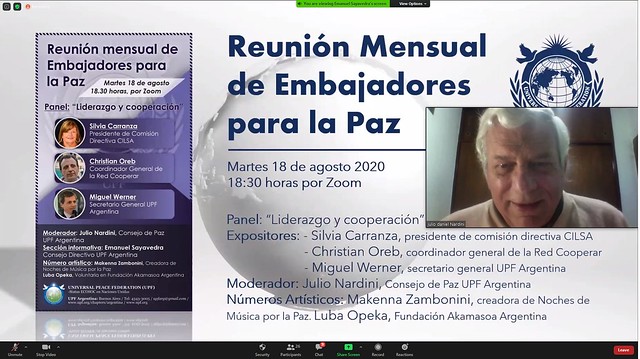Para leer en español, haga clic aquí.
Buenos Aires, Argentina—“Leadership and Cooperation” was the theme of the panel at UPF-Argentina’s August Ambassadors for Peace meeting, with the usual reports on initiatives and activities and an artistic performance. The Zoom meeting, with 31 connections, took place on August 18, 2020, a meaningful date because it was the 20th anniversary of the UPF founders’ speeches at the United Nations. Speakers were Silvia Carranza, president of the governing board of CILSA, an inclusive NGO; Christian Oreb, general coordinator of Red Cooperar; and Miguel Werner, UPF-Argentina’s secretary general.
To see the recording of the meeting, click here.
Silvia Carranza focused on leadership, which “aligns desires into a common goal.” She described three types of leadership: autocratic, liberal, and democratic. Then, she focused on charismatic leadership: “the one which connects accurately with others, brings the best out of everyone and, above all, adapts to contexts and knows how to perform according to the possibilities that are given,” she expressed. “These leaders are spontaneous, confident, open to change, and they inspire confidence and optimism,” she added. She ended her presentation with images of CILSA’s work (Solidary Inclusion Center in Argentina), an entity with over 50 institutional years in our country. They display their service vocation and practice their faith and force of will, their ability and leadership to promote inclusion of those who are socially vulnerable and people with disabilities. “It is not important what we promise, but what we fulfill …. Inclusion unites us,” she concluded.
Christian Oreb talked about cooperation with his usual passion and social commitment. This is related to the work he carries out at Red Cooperar of Civil Society Organizations of the Autonomous City of Buenos Aires, established in 2015, which has more than 20 diverse entities as active members or supporters. He shared one slide during his speech, one of the points of the declaration “Commitment of Solidarity and Peace” signed along with UPF on December 6, 2016, at the Marina Mercante University, for the International Volunteer Day 2016. He emphasized “the need of connecting each other in cooperation,” since “we are in others. . . .An evolutionary strategy of progress that requires greater empathy and altruism” was seen as needed after a survey taken of the guests who attended the bicentennial celebration of Argentina in 2016. “But cooperating is, as well, an imperative in current times due to the serious issues our society, humanity and the planet are facing,” he concluded. He ended his speech by enhancing the value of reciprocity and group efforts and by paraphrasing Gandhi: “You must be the change you want to see in the world.”
Miguel Werner began saying that we face a values crisis and conflict: “a prevalently material crisis; a leadership crisis and conflict, mainly due to particular or sectoral interests.” He proposed to leave aside material values and focus on values that allow mutual understanding and revive the common good. He stated that leadership and cooperation are two of UPF-Argentina’s lines of action, related to the founding mission of UPF, where it mentions a “new level of leadership,” with special focus on interrelation and cooperation: with the UN, in its primal mission of peace; the different government bodies and jurisdictions, and CSOs. By working with different fields, we can develop and overcome various and deep issues that humanity and the planet are facing. We are centered on three aspects of leadership: “values;” “cooperation/fellowship;” and a “parents’ leadership:” “a leadership with a peace perspective.” (1)
Moderator of the meeting was Julio Nardini, member of UPF-Argentina’s Peace Council. The information section of July’s activities and upcoming events was in the charge of Emanuel Sayavedra, member of UPF-argentina’s governing board. At that moment, we remembered Orfa Pérez, secretary of the Peace Council, who passed away on July 22. Graciela Almada reported on the interreligious panel and Adrián de Angelis on the journalist’s panel, both from the Zoom webinar leadership series (2). In the artistic section, Makenna Zambonini, creator of Noches de Música por la Paz, performed “Cantaré, cantarás” and “Aprender a volar;” and Luba Opeka, contributor at Akamasoa Foundation in Argentina, concluded by reciting Desiderata.
It is worth recalling that in May’s monthly meeting, we had a panel that shared their knowledge and experiences related to protecting the environment, raising awareness on sustainability and educating about the use of natural resources and recycling under the theme “Peace with Creation.” June’s panel, “Peace with the Neighbor,” focused on solidarity, volunteering and service, humanitarian aid, and the value of compassion. Respectively, they represented UPF’s lines of action: “Environment and Sustainability” and “Volunteering and Service for Peace.”
In July, the line of action highlighted was “Art, Sports and Peace Culture,” emphasizing the contribution of different artistic expressions (literature, poetry, illustration, painting, music, dance, etc.), the language and the world of symbols of local and global peace, based on universal values, transcending borders, ideologies, and religions. The same happens with sports, with values such as respect for the rules and teamwork, cooperation and good relationships to achieve the desired results.
Quotes
1) PowerPoint presentation:
https://es.slideshare.net/UPFArgentina/liderazgo-y-cooperacin
2) PowerPoint informative section:
https://es.slideshare.net/UPFArgentina/programa-reunin-embajadores-para-la-paz-upf-argentina-1882020

